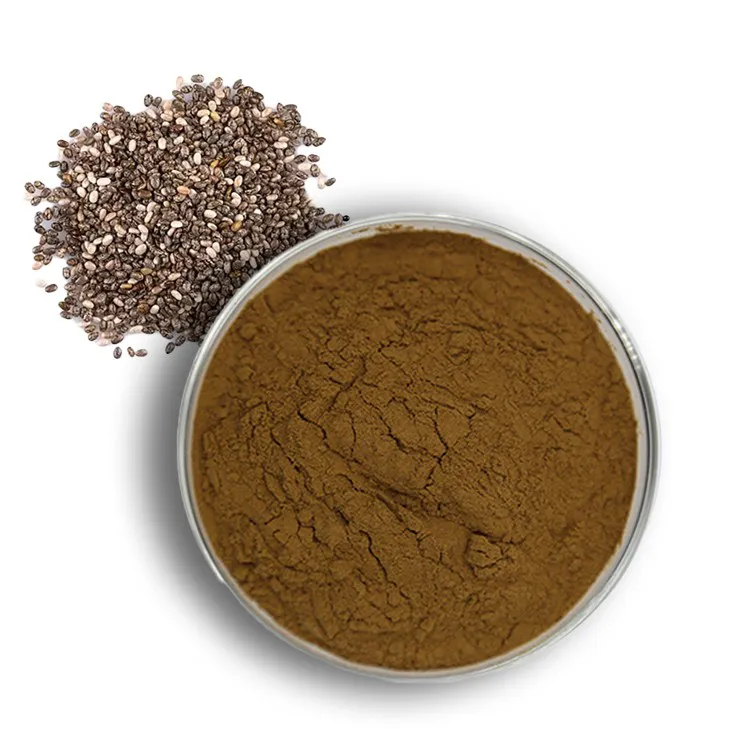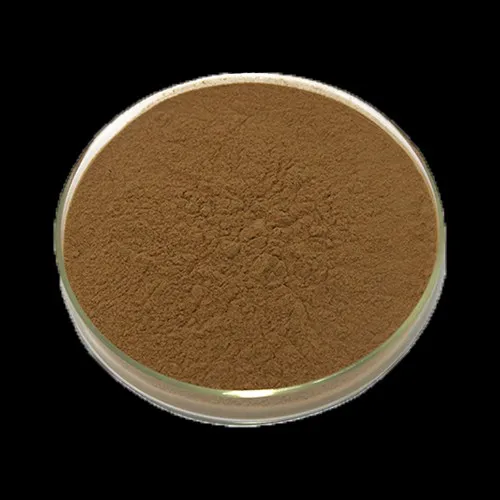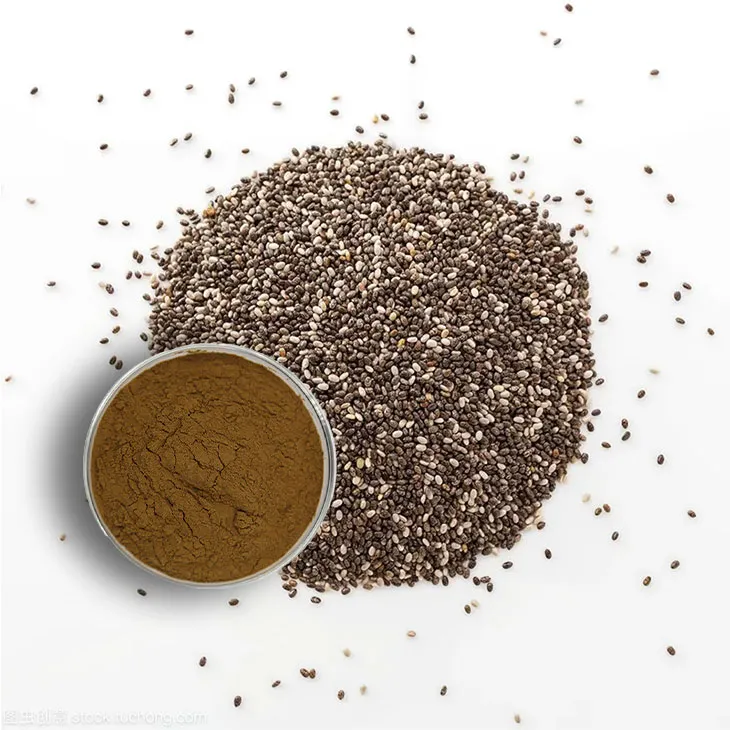- 0086-571-85302990
- sales@greenskybio.com
Chia seed powder: Is the extract effective for weight loss?
2024-11-13

Introduction
In recent years, chia seeds have emerged as a popular superfood, especially within the fitness and weight - loss community. These tiny seeds, which are native to Central and South America, have been touted for their numerous health benefits. One of the most prominent claims is their potential to aid in weight loss. Chia Seed Powder, an extract of the whole chia seeds, is often marketed as a convenient way to incorporate the benefits of chia seeds into one's diet. But does it really live up to the hype? This article aims to explore the scientific evidence behind Chia Seed Powder's effectiveness for weight loss.

Nutritional Composition of Chia Seeds
Fiber Content
Chia seeds are an excellent source of fiber. A single ounce (about 28 grams) of chia seeds contains around 10 - 11 grams of fiber. Fiber plays a crucial role in weight loss in several ways. Firstly, it adds bulk to the diet without adding many calories. This means that it can help you feel full for longer periods, reducing the overall calorie intake. Soluble fiber, in particular, forms a gel - like substance in the gut, which slows down digestion and the absorption of carbohydrates. This can lead to more stable blood sugar levels and prevent sudden spikes and crashes in energy, which are often associated with increased hunger and overeating.
Healthy Fats
Chia seeds are also rich in healthy fats, specifically omega - 3 fatty acids. These fats are considered "good" fats as they have various health benefits. In the context of weight loss, omega - 3 fatty acids may help regulate metabolism. They can increase the body's sensitivity to insulin, which is important for proper blood sugar control and energy metabolism. Additionally, healthy fats are more satiating than other macronutrients, such as carbohydrates or proteins. This means that consuming chia seeds with their high - fat content can contribute to a feeling of fullness, potentially reducing the urge to snack between meals.
Other Nutrients
Besides fiber and healthy fats, chia seeds contain other important nutrients such as protein, vitamins (such as vitamin B complex), and minerals (such as calcium, magnesium, and phosphorus). Protein is also a satiating nutrient, and its presence in chia seeds further adds to the overall feeling of fullness when consumed. The combination of these nutrients in chia seeds makes them a potentially valuable addition to a weight - loss diet.

How Chia Seed Components May Impact Weight Loss
Metabolism Regulation
The omega - 3 fatty acids in chia seeds can have a positive impact on metabolism. As mentioned earlier, they increase insulin sensitivity. This is beneficial because when the body is more sensitive to insulin, it can better regulate blood sugar levels. When blood sugar is well - controlled, the body is more likely to use stored fat for energy rather than relying on a continuous supply of high - glycemic carbohydrates. Moreover, some studies suggest that omega - 3 fatty acids may also increase the activity of certain enzymes involved in fat metabolism, such as lipoprotein lipase, which helps break down fats in the bloodstream for use as energy.
Appetite Suppression
The high fiber and healthy fat content of chia seeds contribute to appetite suppression. When chia seeds are consumed, they absorb water and expand in the stomach. This expansion creates a feeling of fullness, signaling to the brain that the body has had enough to eat. This can be particularly helpful for those trying to control their calorie intake. In addition, the slow digestion of chia seeds due to their fiber content means that the feeling of fullness lasts longer. This can prevent overeating and snacking, which are common obstacles in weight - loss efforts.

Real - Life Experiences and Studies on Effectiveness
Real - Life Testimonials
Many individuals who have incorporated Chia Seed Powder into their diets report positive experiences with weight loss. Some claim that adding chia seed powder to their morning smoothies or oatmeal has helped them reduce their overall appetite and cravings for sugary or high - calorie snacks. For example, one person reported that after starting to consume chia seed powder daily, they noticed that they were able to go longer between meals without feeling hungry, and over time, they saw a gradual decrease in their body weight. However, it's important to note that these are individual testimonials and may be influenced by other factors in a person's diet and lifestyle.
Scientific Studies
Several scientific studies have also been conducted to investigate the effect of chia seeds on weight loss. In some animal studies, chia seed supplementation has been shown to lead to a reduction in body fat percentage. For instance, in a study on rats, those fed a diet containing chia seeds had lower levels of abdominal fat compared to the control group. In human studies, the results have been somewhat mixed. Some small - scale studies have reported a modest reduction in body weight and body mass index (BMI) in participants who consumed chia seeds regularly. However, larger, more comprehensive studies are still needed to draw more definitive conclusions.
Potential Side Effects and Considerations
Digestive Issues
While chia seeds are generally safe for consumption, they can cause some digestive issues in certain individuals. Due to their high fiber content, if not consumed with enough water, chia seeds can swell in the digestive tract and cause constipation, bloating, or abdominal discomfort. To avoid these issues, it's important to drink plenty of water when consuming chia seed powder. For example, if you add a tablespoon of chia seed powder to a drink or meal, make sure to drink an additional glass of water.
Allergic Reactions
Although rare, some people may be allergic to chia seeds. Allergic reactions can range from mild symptoms such as itching and hives to more severe symptoms like difficulty breathing and anaphylaxis. If you have a history of allergies, especially to other seeds or nuts, it's advisable to be cautious when trying chia seed powder for the first time. Start with a small amount and monitor your body's reaction closely.
Calorie Consideration
While chia seeds can be beneficial for weight loss, it's important to be aware of their calorie content. Although they are nutrient - dense, chia seeds are not calorie - free. If you consume large amounts of chia seed powder without accounting for the added calories, it could potentially lead to weight gain rather than loss. For example, a quarter - cup of chia seeds contains approximately 190 calories. So, it's crucial to incorporate chia seed powder into a balanced diet and monitor your overall calorie intake.
Conclusion
In conclusion, chia seed powder has several characteristics that make it a potentially useful addition to a weight - loss regimen. Its high fiber and healthy fat content, along with its potential to regulate metabolism and suppress appetite, are all factors that could contribute to weight loss. However, the evidence from scientific studies is not yet conclusive, and individual results may vary. Additionally, there are potential side effects and considerations to keep in mind, such as digestive issues, allergic reactions, and calorie intake. For those interested in using chia seed powder for weight loss, it's advisable to start with small amounts, incorporate it into a balanced diet, and drink plenty of water. As with any weight - loss strategy, it's also important to combine the use of chia seed powder with regular exercise and a healthy lifestyle overall.
FAQ:
1. What is the nutritional composition of chia seed powder?
Chia seed powder is rich in nutrients. It contains a high amount of dietary fiber, which can help with digestion. It also has healthy fats, such as omega - 3 fatty acids. Additionally, it has proteins, vitamins, and minerals. The high fiber content can make you feel full for a longer time, and the healthy fats are beneficial for overall health.
2. How does chia seed powder affect metabolism?
The fiber in chia seed powder may play a role in metabolism. It can slow down the digestion process, which helps in a more stable release of energy. Some components in chia seeds might also interact with the body's metabolic processes at a cellular level, but more research is needed to fully understand this aspect. However, it is not a magic bullet for significantly boosting metabolism on its own.
3. Can chia seed powder really suppress appetite?
Yes, it can. When chia seed powder is consumed, it absorbs water and forms a gel - like substance in the stomach. This expansion in the stomach can send signals to the brain that you are full, thus suppressing appetite. However, individual responses may vary, and it should be part of a balanced diet rather than the sole method for appetite control.
4. Are there any side effects of using chia seed powder for weight loss?
If consumed in excessive amounts, chia seed powder can cause some digestive issues like bloating, gas, or constipation. Also, for people with certain medical conditions such as swallowing difficulties or a history of intestinal blockages, it may pose risks. It is important to start with a small amount and gradually increase the intake while monitoring your body's response.
5. How much chia seed powder should be consumed for weight loss?
There is no one - size - fits - fits - all answer. Generally, starting with 1 - 2 tablespoons per day is a common recommendation. However, this can be adjusted based on individual factors such as body weight, overall diet, and activity level. It is advisable to consult a healthcare provider or a nutritionist for personalized advice.
Related literature
- Title: The Role of Chia Seeds in Nutrition and Health"
- Title: "Chia Seeds: A Review of Their Nutritional and Functional Properties for Weight Management"
- Title: "Investigating the Impact of Chia Seed Extract on Appetite and Metabolism"
- ▶ Hesperidin
- ▶ citrus bioflavonoids
- ▶ plant extract
- ▶ lycopene
- ▶ Diosmin
- ▶ Grape seed extract
- ▶ Sea buckthorn Juice Powder
- ▶ Beetroot powder
- ▶ Hops Extract
- ▶ Artichoke Extract
- ▶ Reishi mushroom extract
- ▶ Astaxanthin
- ▶ Green Tea Extract
- ▶ Curcumin Extract
- ▶ Horse Chestnut Extract
- ▶ Other Problems
- ▶ Boswellia Serrata Extract
- ▶ Resveratrol Extract
- ▶ Marigold Extract
- ▶ Grape Leaf Extract
- ▶ blog3
-
Cranberry Plants and Skin - care Products.
2024-11-13
-
Senna Leaf Extract
2024-11-13
-
Apricot Powder
2024-11-13
-
Feverfew Extract
2024-11-13
-
Selenium yeast
2024-11-13
-
Mulberry Extract
2024-11-13
-
Artichoke Leaf Extract
2024-11-13
-
Garcinia Cambogia Extract
2024-11-13
-
Hawthorn Extract
2024-11-13
-
Shikonin
2024-11-13
-
Calendula Extract
2024-11-13





















